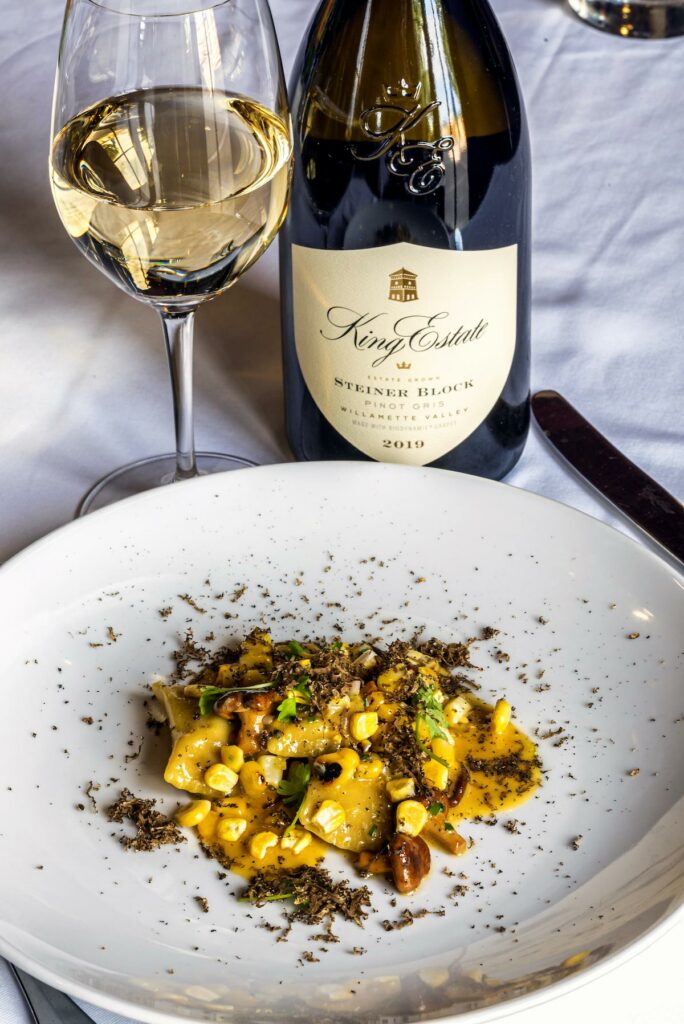
In some ways, Steiner Block Pinot Gris serves as the quintessential example of King Estate, a wine that comes from a heritage planting by the King family and a unique project by the team responsible for producing more Pinot Gris than anyone else in the Pacific Northwest.
“Internally, it’s a winemaker’s favorite for sure,” Brent Stone says with a smile. “It’s such a cool story from where we pull the fruit from to how we make it. It’s the oldest block on the property and still own-rooted, planted in 1992 vines.
“It’s the last block to come into the winery because it’s old and own-rooted, so you get a ton of hangtime on it and complexity out of it, but the alcohol in the wine is only 12.5%,” he added. “It’s along the lines of a traditional Alsatian profile.”
And there were just 100 cases of the King Estate 2019 Steiner Block Estate Biodynamic Pinot Gris produced.
Stone, the chief operating officer and lead winemaker, takes pride in producing wines from the largest Biodynamic certified vineyard on the continent.
“I would say that about 25% of our wines carry the Biodynamic label,” he says.
This section of the vineyard is named for Rudolf Steiner, viewed as the father of the Biodynamic movement he developed after World War I. Dismayed by the increased use of chemicals and mechanization, the Austrian — who warned Europe about the rise of Nazism and became a target of Hitler — encouraged farmers to adopt homeopathic treatments to their fields. The Biodynamic Association refers to it as “a spiritual-scientific approach.”
Vineyard manager Meliton Martinez, who has been in his position since 1999, started at King Estate the year after the Steiner Block was established. Plant pathologist Raymond Nuclo began working at King Estate in 2011 — the same year Stone arrived — and now serves as the director of viticulture.
Ed King and his late father transitioned their 1,033 acres to certified organic in 2002. And in 2016, King Estate achieved its Demeter certification. That means there are no herbicides, synthetic fertilizers or pesticides applied to the property. Instead, Martinez and his crew spread more than 1,000 tons of compost across the 460 acres of vines. Pinot Gris accounts for nearly two-thirds of that acreage.
Among the King family’s recent investments in the cellar has been the introduction of a concrete egg fermenter.
“When we were first talking about what to put in the eggs, ‘What would be really unique and really awesome every year, what comes in really late?’ — we narrowed it down to this block,” Stone says.
Steiner Block Pinot Gris is hand-harvested, crushed and then fermented in the concrete egg. Winemakers report a gentle “convection current” produced during fermentation moves the lees during its six months in the egg.
“There’s brightness, but you get a certain amount of softening on the palate from the concrete,” Stone explains.
Other descriptors include honeysuckle, kiwi fruit and peach skin, backed by pleasing acidity and a fascinating sense of minerality accented by the concrete egg fermentation.
The Steiner Block is on the southeastern-most tip of the estate a stone’s throw from Territorial Road. While the vines are soldiering on, entering their fourth decade of life, this block of Pinot Gris typically comes in at just 2 tons per acre — a level of production below many high-end Pinot Noir vines.
That wouldn’t pencil out at the vast majority of wineries. Here, that’s not a factor for King Estate. It’s among the Tower Club member wines, but occasionally a few bottles of those wines make their way into the tasting room and the restaurant wine list. It’s an ideal match for seafood and cream-based pasta dishes.
“It’s a wine you can only find here,” Stone says with pride. “And it’s a Pinot Gris, which we have a pretty good reputation for.”

Leave a Reply